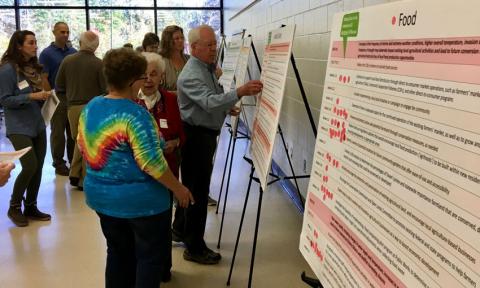Action Plans and Impacts

The strangely warm temperatures on Saturday, Oct. 21 — 15 degrees over the average high temperature for the month — were quite fitting as over 30 Dover citizens convened at the local middle school to discuss the impacts of climate change on their community.
The city is currently developing a climate adaptation chapter for its master plan— the first of its kind in the region. This chapter will guide the city in taking steps to mitigate greenhouse gas emissions and adapt to the impacts of climate change. Municipal planning may not sound thrilling, but it was important enough to these residents that they spent a sunny fall Saturday talking about the ways Dover can address the changing climate.
A committee of nine Dover residents, city staff and municipal board members led the development of the chapter, with guidance and support from the Strafford Regional Planning Commission. UNH Cooperative Extension and N.H. Sea Grant staff organized outreach efforts to ensure that residents had opportunities to provide input, including a public input session held in late October and an online survey.
Participants broke into small groups and discussed six topics: energy, food, infrastructure, health and safety, natural resources, and water availability and quality. The steering committee drafted a suite of actions on how climate change will affect these six areas, and workshop attendees provided feedback on these draft actions. The first step was a sticky-dot activity to prioritize which actions the participants wanted to discuss. These actions ranged from incorporating sea-level rise and extreme precipitation into infrastructure investments and hazard mitigation plans, to exploring the feasibility of installing solar panels on city buildings and protecting buffers around wetlands.
Participants broke into small groups and discussed six topics: energy, food, infrastructure, health and safety, natural resources, and water availability and quality.
The discussion ranged from positive, supportive reactions for some actions to critiques of other actions as perhaps not strong and forward-thinking enough. Other actions were flagged for clarification, greater specificity, or caution. Extension and N.H. Sea Grant staff are compiling feedback from the event and the online survey, which will be presented to the steering committee members, who will then revise the chapter to present to the Planning Board for adoption early next year. The draft chapter can be found here. Hats off to the Dover residents who spent a beautiful Saturday morning discussing their concerns about climate change and ideas for action!
This effort is part of the N.H. Setting SAIL project, which is focused on supporting implementation of recommendations from the N.H. Coastal Risk and Hazards Commission report. This project was funded in part by NOAA’s Office for Coastal Management under the Coastal Zone Management Act, in conjunction with the N.H. Department of Environmental Services Coastal Program.
